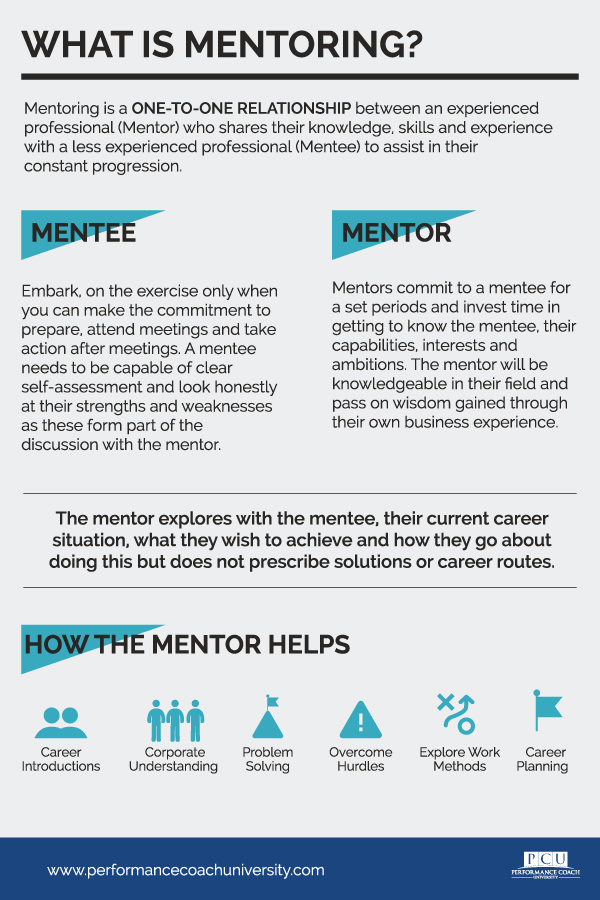Mentoring refers to a process through which someone more experienced takes another who is less experienced and guides them so that they can grow both professionally and personally. This mentor can be either assigned to or selected by the mentee. The mentor can be either a direct superior of the mentee or the mentor can be from another department or even another industry altogether. For a mentorship relationship to be beneficial, the mentee has certain obligations which they must fulfill so that they can reap the benefits brought by the presence of a mentor in their life.
Obligations of a Mentee
It is important for you as a mentee to enter the mentorship relationship when you are aware of your strengths and limitations. This self-awareness will come in handy when the mentor starts asking you questions in order to get a deep understanding of where you are at, and where you want to go, plus the limitations stopping you from getting there.
Related: What’s the difference between a mentor vs coach vs consultant? Learn here!
You also need to be committed to attending all the mentorship meetings agreed upon so that the mentor can be certain that you are serious about the exercise. If for any reason you will be unable to attend a given meeting, communicate to the mentor in good time so that he or she doesn’t have to learn at the last minute that you will be unavailable. Timely communication shows that you respect other people’s time, and you are organized.
Participate in all mentorship meetings if you want to benefit fully from them. After all, it is you who needs help, not the mentor.
How Mentors Help Mentees
Skills Transfer
A mentor is usually more experienced than the mentee. Consequently, chances are high that one will select a mentor who possesses the skills that the mentee wishes to acquire. For example, a successful entrepreneur can mentor a younger person who wishes to start and build their own business.
During the mentorship process, the mentor will, so to speak, hold the hand of the mentee and guide them on the journey that the mentor has already traveled and the mentee is just embarking upon. In this way, the mentor will equip the mentee with the skills that they need to succeed.
Career Introductions/Networking
A mentor also plays the crucial role in making career introductions or providing networking opportunities for the mentee. Having spent more years in the industry, a mentor has a wider professional network to which he or she can open the door for the mentee. These career introductions can help the mentee to grow quickly within the industry as a result of the insights gained from the interactions with the professionals he or she encounters in the course of the mentorship relationship.
Role Modeling
One of the most effortless roles that a mentor plays is that of a role model to the mentee. In fact, the mentee may have selected a particular person as a mentor simply because the mentee admires and would like to emulate various aspects of the mentor’s personal and professional life. For example, a mentee can benefit from the calm way in which an experienced mentor handles conflict at the workplace. By modeling this behavior, a mentee will accelerate their way up the professional ladder.

Career Planning
A mentor also plays an instrumental role in helping a mentee to plan their career properly. Because of inexperience, a mentee may not know what steps they need to take in order to position themselves to take advantage of any career growth opportunities which may arise.
The interactions with a mentor can help such a person to identify which skills they need to acquire and how those skills can be acquired without compromising the current role which the mentee has in the company.
RIGHT CLICK & SAVE THIS HELPFUL INFOGRAPHIC

Being a Critical Friend
You need to have a relationship of mutual trust and respect with your mentor so that he or she can be your critical friend. In this role, the mentor can help you to explore your thought processes and even challenge some of the beliefs which you have.
As these interactions continue, you will acquire insights into the limitations of your thought patterns and the resulting mental growth will propel your career forwards.
The mentor will also be available to listen to your fears, frustrations and concerns about what is happening in your professional life. He or she can then offer encouragement, advice and suggestions about how you can navigate the challenges which you are facing. Your mentor will also celebrate your successes with you!
Note that while the mentor will offer advice and recommendations, you are in no way obliged to act upon those suggestions or advice. It is entirely up to you to use your discretion to decide the best way forward, using the mentor’s suggestions as additional options from which you can formulate the best approach to handling a given situation.
Exploring Work Methods
As already mentioned, mentors tend to be more experienced in an industry, so working with such individuals can help you to learn the ropes without making too many mistakes. The mentor will observe or question you about how you do your work and he or she will point out how you can improve the way you do your work.
A mentorship relationship can, therefore, shorten the learning curve which every inexperienced person must go through before they reach the highest levels of competence. Having spent more time in the field, the mentor can show you newer and easier ways to get things done.
Overcoming Obstacles
You can also benefit from your mentor during the times when you encounter obstacles on your professional journey. For example, your relationship with your supervisor may get rocky and threaten to jeopardize your stay at the company.
When you talk the situation over with your mentor, he or she will offer suggestions on how to resolve the situation. In this way, a potentially career-threatening situation will be fixed before it escalates.
Can Coaches be Mentors?
You may be asking yourself, Can Coaches be Mentors? The answer is a resounding YES – They can be. The key is to allow space for your mentee to work things out for themselves. A great mentor is going to tell you what worked for them and guide you to a solution that will work best for you. As a mentor, you are a guide to their desired goal, however, your goal is to be able to create enough space so that the person can make their own decisions.
As you can see, a mentorship relationship can be a major factor in accelerating your professional and personal growth if you and the mentor are well matched. It is therefore in your best interest to develop a life-long relationship with one or more mentors so that you can tap into their immense experience, knowledge, and expertise. Before long, you too will be a mentor to others!
To Your Success,
Jairek Robbins + Team PCU
Are you ready to become a performance coach?
If you are not a PCU student and want to add deeper meaning and purpose to your life and business through coaching, now is the time! Now more than ever people are openly looking for coaches, someone in their corner to help guide them to achieving their goals. They want to perform better in their jobs, lives, health, and relationships and they know working with a coach is the answer. Let that coach be you!
As a coach, you can make a real lasting impact in the lives of others. But do you know how to develop your clients’ personal and professional performance? Don’t worry, we got you covered! PCU gives you the exact framework, tools, and support you need to succeed. Tap into the emerging demand of performance coaching.
Learn more at:
